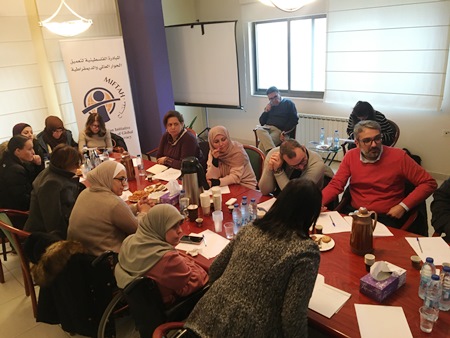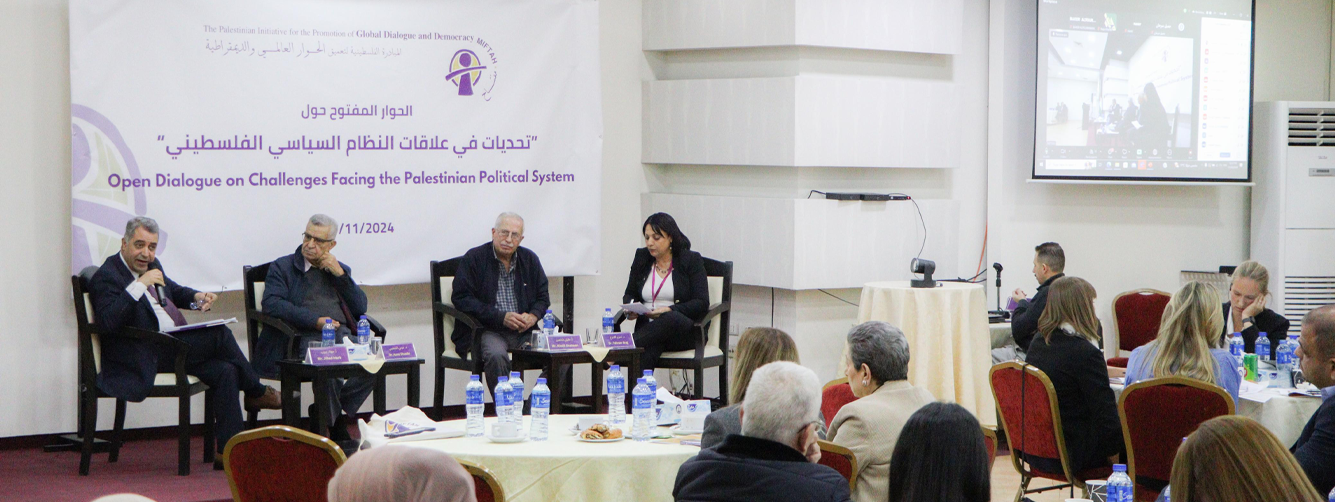MIFTAH recently held a public policy meeting to discuss the results of a factsheet, which is based on its survey on the compatibility of the national referral system “Takamul” and its responsiveness to the needs of disabled women. The objective of the meeting was to come out with recommendations for impacting policies and procedures pertaining to the national referral system for battered women so it is more responsive to the needs of women and girls subjected to gender-based violence, by focusing on the protection and empowerment of women with disabilities.
The session highlighted the approaches adopted by the survey, which was conducted by legal researcher Islam Tamimi, through a series of focus group discussions with disabled persons and their families in the central, northern and southern districts, in addition to interviews with experts and directors of shelters and officials from various ministries included in the national referral system. Furthermore, some statistics were showcased on the levels of violence against women including women with disabilities and the gaps related to legislation and laws, including the Palestinian Disability Law No. 4 of 1994, indicating to the fact that this law does not include provisions that meet the specific needs of battered women with disabilities.
During the session, recommendations were made to promote a legal and legislative environment and mechanisms for monitoring and follow-up, which would reduce violence against women with disabilities. This included the need for battered women and the parties that follow up with them to participate in setting policies, legislation and procedural and executive bylaws for duty-bearers to enable battered women with disabilities to benefit from the services of the referral system “Takamul” and expedite the ratification of the Family Protection Law and the Disability Law as agreed upon. Another recommendation was to raise the awareness of women with disabilities through reporting or filing complaints, in addition to the need for capacity-building for members of law-enforcement, especially the police, regarding procedures and instructions for dealing with issues of battered women with disabilities.
The presentations by representatives from relevant official institutions and civil society and rights organizations, also included a number of recommendations, including the need to unify the concept of protection for women with disabilities and efforts to rehabilitate safe houses, including those run by the Ministry of Social Development, so they are able to accommodate the victims of cases of violence against women with disabilities. Other recommendations included the criminalization of gender-based discrimination and the adoption of a program for legal assistance for women with disabilities.
MIFTAH project coordinator Hanan Said explained that the session is part of the ”Inclusive Actions in GBV Programing in Emergencies” project, which MIFTAH implements with funding from the International Rescue Committee (IRC). She also said it was part of MIFTAH’s strategic approaches to promote a legislative environment and influence public policies in a way that would achieve protection of citizen rights and its contributions to civil society efforts to combat violence against women in Palestinian society. She said MIFTAH works on promoting women’s access to protection through opening the door to dialogue on the national referral system for battered women “Takamul” in a way that would contribute to influencing policies and procedures related to the referral system so it is more responsive to the needs of women and girls subjected to gender-based violence, by focusing on the protection and empowerment of women with disabilities.









